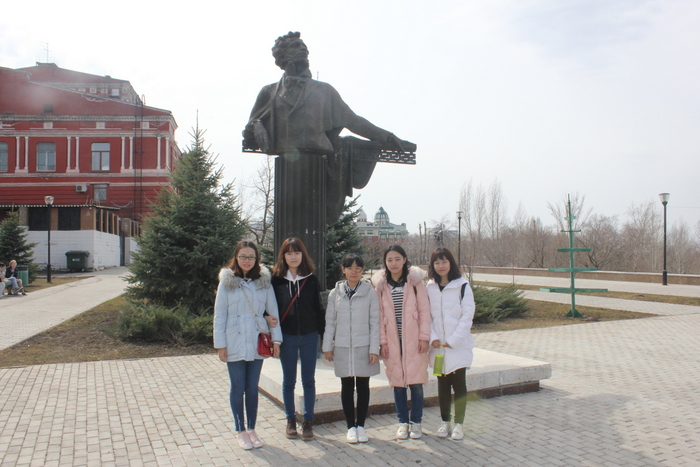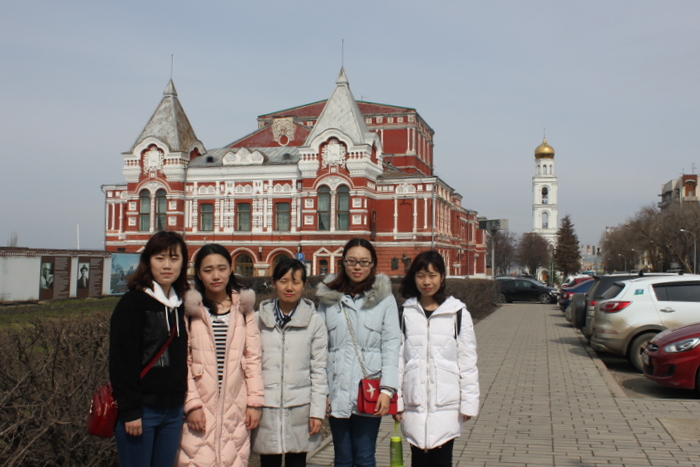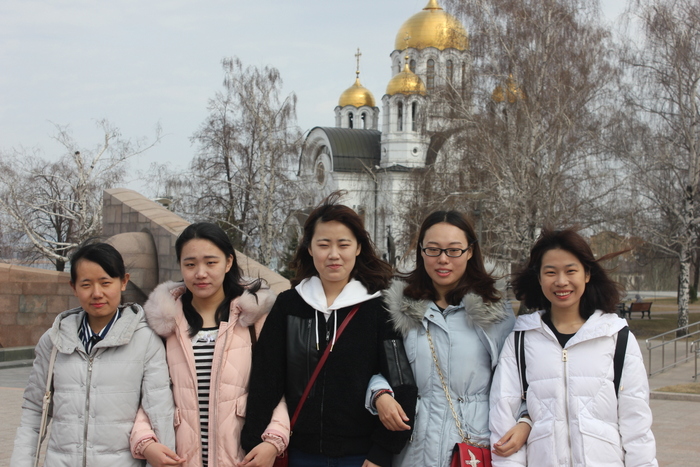During the second term female students of School of Foreign Languages of Hebei Normal University (Baoding, China) – Sjue Jan'jan', Jan Fan', Van Czin', Ma Jujnin and Czjao Chjen' – were taking internship in languages at Samara National Research University. We are talking with the Chinese students and director of their internship - Evgeniy Stefanskiy – who has a doctoral degree in philology and is a director of Pre-university Education Centre of International Office.
- Evgeniy Evgenevich, why have you invited students of this university for this internship?
- I have had business relations with the colleagues from Hebei University for nearly 15 years. We have issued joint scientific collections, exchanged visits regularly. During our last trip to Baoding our interpreters were students of School of Foreign Languages and they were trained very well. At lectures Chinese students asked me many serious professional questions. It was then that I invited a group of Chinese students to us.
- Evgeniy Evgenevich, what was included in the course of the internship?
- We discussed its programme before the girls’ arrival to Samara. They are in their third year that is why our Chinese colleagues have already provided them with a wonderful knowledge-base: they have lovely pronunciation (and it is very difficult to learn Russian phonetics for Chinese native speakers), large vocabulary, brilliant practical and theoretical grammar. That is why we have decided that it makes sense to deal with various stylistic aspects here.
- Girls, why have you decided to study Russian at university?
Czjao Chjen': Collaboration in various spheres is being actively developed between China and Russia. We are sure that knowledge of Russian will make it possible for us to find a good job.
- What was your idea of Russia and what was your impression of it when you came to Samara?
Jan Fan': We knew that Russia is the biggest country in the world, strong frosts happen here. And we felt it. Unlike China Russia has a very fresh air without smog.
Van Czin': We liked sights of Samara and Moscow, the Volga sceneries, solemn churches. But most of all we liked people. Russian people are kind and hospitable.
Ma Jujnin: Yes-yes. Here people are sincere. They do not have false smiles. Everyone with whom we communicated tried to help us.
- Which classes in your internship course are the most memorable?
Sjue Jan'jan': We were at classes given by Evgeniy Evgenevich with the students of pre-university courses where terms of Physics, Chemistry and Mathematics were studied.
Van Czin': And together with the students of Faculty of Philology and Journalism we listened to the lectures on Russian literature of XX century read by Tatyana Valentinovna Zhurcheva.
Ma Jujnin: Classes on official documentation and business language were very useful for us.
Jan Fan': I became very interested in stylistics of literary speech. I would like to write a diploma work connected with this problem.
- I know that you have not only studied Russian but taught your native language in Chinese Centre of our University as well. Please, tell us about your teaching experience.
Sjue Jan'jan': Before the first class on Chinese we were worried a bit as it was for the first time that we had taught our native language to Russians. We had been preparing for a long time for this, found commentaries of some rules in the Internet.
Van Czin': We had to revise special rules of transcription – pinyin as Russian students were to be shown how Chinese hieroglyphs were read. We hope that we have succeeded in it.
- During this time you might have had interesting meetings, made new friends?
Czjao Chjen': Yes. We participated in the celebration of Chinese New Year in one of Samara schools. Children are studying Chinese a bit there.
Ma Jujnin: At Faculty of Philology and Journalism we got acquainted with many Russian students, went out together, communicated. The guys helped us a lot. They are kind, pleasant and communicative. Their friendship is very precious to us.
- What amazed you most of all in Russia?
Jan Fan': I was impressed by the fact that almost all Russian babushkas do make-up. They seek beauty despite their age. Moreover, they look energetic. In this way they are different from Chinese old ladies. In my opinion, they are very optimistic.
Van Czin': We paid attention to the fact that in Russia vegetables are very expensive and the Russians eat potatoes much in the way we eat rice.
Sjue Jan'jan': We, of course, noticed that both Russian cuisine and traditions of eating differ from the Chinese ones greatly.
- What is the difference between the Russians and Chinese in everyday life?
Ma Jujnin: Coming across problems the Chinese prefer to evade or go round them while Russians usually solve the questions directly.
Czjao Chjen': Chinese students are less active than Russian ones in university events.
Jan Fan': The Chinese are shier, they are timid to demonstrate their advantages and Russians tend to show their worth.
Sjue Jan'jan': The greater part of young people in China depends on parents and the youths in Russia are more independent. Among my Russian friends many people have part-time jobs or rent flats on their own.
Van Czin': In my opinion, people in China often work more effectively than in Russia. We think that Russians like to postpone.
- Evgeniy Evgenevich, are you going to continue organizing similar internships for international students?
- Certainly. This internship is a promo-tour to some extent. The girls got acquainted with Samara and our university. Hope that they will share impressions with their friends and next year new students from Hebei University will visit us. We are waiting for the students from other countries as well. The other day a cooperation agreement was signed with a university in Croatia which means that guests from the shores of the Adriatic are going to visit Samara.
Interview is prepared by the editorial staff of the Polet




 RU
RU  EN
EN  CN
CN  ES
ES 